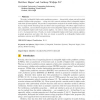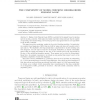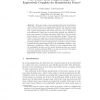333 search results - page 5 / 67 » On the complexity of partial order trace model checking |
171
click to vote
FSTTCS
2010
Springer
14 years 9 months ago
2010
Springer
We study (collapsible) higher-order pushdown systems -- theoretically robust and well-studied models of higher-order programs -- along with their natural subclass called (collapsi...
LMCS
2007
14 years 11 months ago
2007
Higher-Order Fixpoint Logic (HFL) is a hybrid of the simply typed λ-calculus and the modal µ-calculus. This makes it a highly expressive temporal logic that is capable of express...
77
Voted
ENTCS
2007
14 years 11 months ago
2007
Software model checkers are typically language-specific, require substantial development efforts, and are hard to reuse for other languages. Adding partial order reduction (POR)...
103
click to vote
LATIN
2004
Springer
15 years 5 months ago
2004
Springer
The paper settles a long standing problem for Mazurkiewicz traces: the pure future local temporal logic defined with the basic modalities exists-next and until is expressively com...
138
Voted
CONCUR
2009
Springer
15 years 6 months ago
2009
Springer
Abstract. The technique of partial order reduction (POR) for probabilistic model checking prunes the state space of the model so that a maximizing scheduler and a minimizing one pe...



